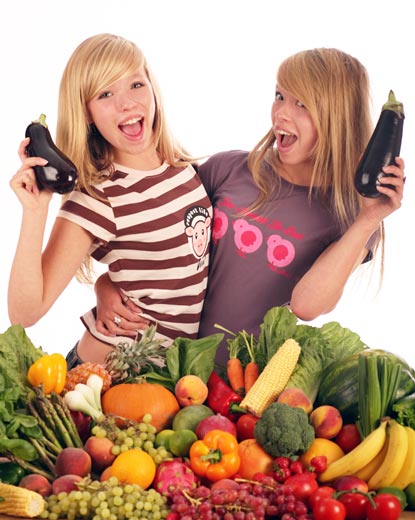What I need each day for good health
Have you ever wondered what you need to eat each day? How much protein and carbohydrate should you get? What types of fat do you need and where can you get them? This handy chart will answer all your questions. It tells you what you need, how much you need and where you can get it – it’s got the lot!
A colourful, laminated version of this useful chart is available in our shop. It’s one of our bestsellers and we love it!
| NUMBER OF SERVINGS | FOODS | HEALTHY PORTION SIZE | TO PROVIDE |
| 5-8 | Fruit & Vegetables to include: Dark Green Leafy Vegetables, Orange Vegetables, Fresh Fruit, Dried Fruit |
Vitamins such as Beta Carotene (makes vitamin A), Vitamins B2, B3, B5, B6, B9 (Folate), Vitamin C, Vitamin E, Vitamin K Minerals/trace elements such as Calcium, Iodine, Iron, Magnesium, Manganese, Phosphorus, Potassium Fibre Energy |
|
| Fresh Fruit | 1 medium piece the size of a tennis ball | ||
| Dried Fruit | 1 – 1 ½ tablespoons or 1 golf ball | ||
| Green or Root Veg | 2-3 tablespoons or ½ tennis ball | ||
| Salad Veg | 80g or 1 large cereal bowl | ||
| 3-4 | Cereals & Grains (eg Wholwheat Pasta, Wholemeal Bread, Brown Rice, Oats, Rye, Buckwheat) | Vitamins such as B1, B2, B3, B5, B6
Minerals/trace elements such as Calcium, Copper, Iron, Magnesium, Manganese, Phosphorus, Potassium, Zinc Fibre |
|
| Cooked Brown Rice | 5-6 tablespoons or 1 teacup | ||
| Breakfast Cereal | 1 regular sized cereal bowl | ||
| Wholemeal Pasta | 1 cup (cooked) as side dish or 2 cups as main dish | ||
| Wholemeal Bread | 2 slices | ||
| 2 or 3 | Pulses (Lentils, Beans, Chickpeas, Soya and products made from them), Nuts and Nut Butters or Seeds |
Vitamins such as B1, B2, B3, B5, B6, B9
Minerals/trace elements such as Calcium, Copper, Iron, Magnesium, Manganese, Phosphorus, Potassium, Selenium, Zinc Fibre |
|
| Peas, Beans and Lentils | ½-1 cup (cooked) | ||
| Tofu, Soya-based Meat Alternatives or Beanburgers | 100 g | ||
| Nuts (unsalted) | 2 tablespoons or a small handful | ||
| SMALL AMOUNTS |
Vegetable Oil (eg Flaxseed, Hempseed or Virgin Olive Oil, used cold; Rapeseed Oil for cooking Vegetables Margarines |
Best for omega-3 fats: ½ tablespoon flaxseed oil or 2 tablespoons of ground flaxseeds |
Vitamin E (Vegetable Oils), Vitamins A & D (Fortified Margarine)
Energy Essential Omega-3 and Omega-6 Fats (Flaxseed, Soya, Walnut and Hemp Oils) |
| DAILY DOSE |
Ideally, everyone should take a B12 supplement Vitamin D is produced by sunlight on the skin in |
Vitamin B12
Vitamin D |
|
| 1.5 litres of water per day (six to eight glasses) to be consumed (All teas, plant milks, home made smoothies etc count. Juice can contribute but as it contains sugar, you should limit consumption to no more than one 150ml glass a day) |
|||
Every Day Think Colour!
Think rainbow and brighten your meals. The chemicals that give foods their beautiful colours are also what protect your health! So take a few minutes to add colour to every meal. Here are a few ideas:
Breakfast
- Add berries, banana and ground flaxseeds to your cereal. Sprinkle with cinnamon to sweeten
- Make a smoothie using berries, any other fruit and unsalted nuts with soya or almond milk
- Add grilled tomatoes to mushrooms on wholegrain toast
 Lunch
Lunch
- Add salads with a vibrant mix of colours – eg rocket leaves, sliced mango, berries, pear,
walnuts, yellow pepper, sweetcorn - Add tomatoes and watercress to your usual sandwich
- Add more veg and any peas/beans/lentils to your soup
- Avocados are very nutritious – try with grated carrot and tomato on wholegrain bread
Evening Meal
- Add extra veg and any peas/beans/lentils to casseroles, pasta, curries and rice dishes
- Eat at least 2 types of veg with your main meal
Snacks
- Snack on a high protein food such as mixed unsalted nuts or seeds with fresh or unsweetened dried fruit – any you enjoy. (The protein slows down the release of the fruit sugars and that’s what your body and brain loves!)
- Raw carrots or celery dipped in hummus or guacamole
- Handful of cherry tomatoes and oatcakes
Rainbow Reminder: The more colours you add to your food – the more health boosting nutrients you eat!
Every Day Think Smell!
Herbs and spices are packed with antioxidants which fight many diseases including heart disease, stroke, diabetes, some cancers and some of the effects of ageing. You only need small amounts of herbs and spices to boost the flavour of your food and your health. Use what you enjoy, here’s a few examples: Black pepper, caraway, cardamom, cayenne, chilli
pepper, cinnamon, coriander, cumin, garlic, ginger, juniper berries, mustard, nutmeg, oregano, parsley, mint, rosemary, sage, saffron, turmeric and thyme
